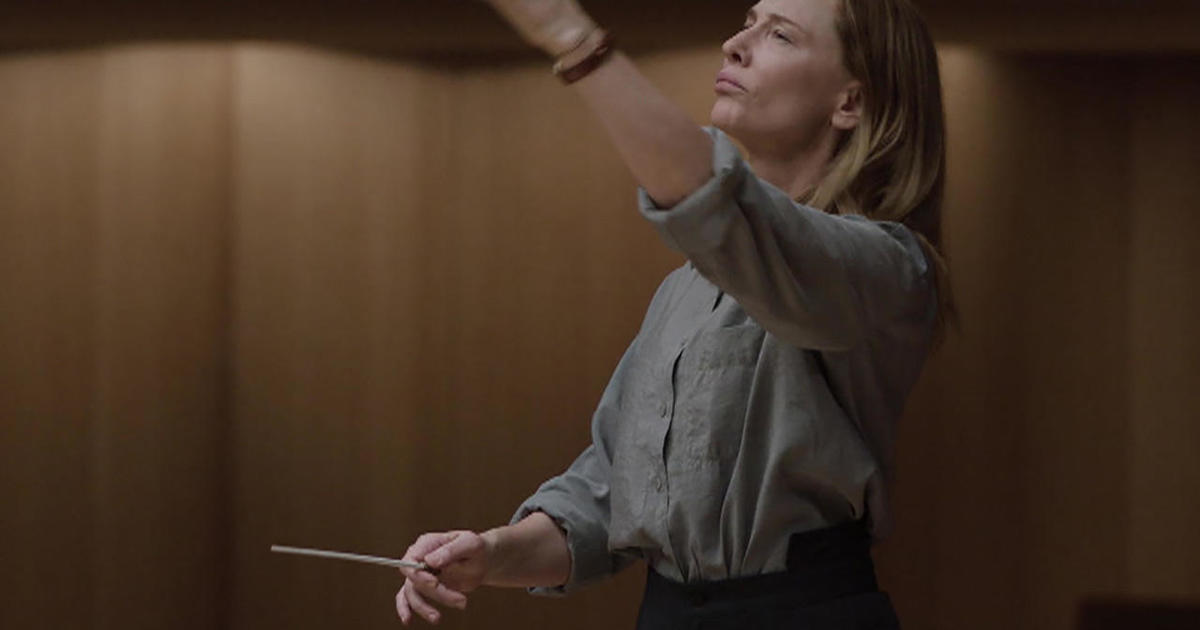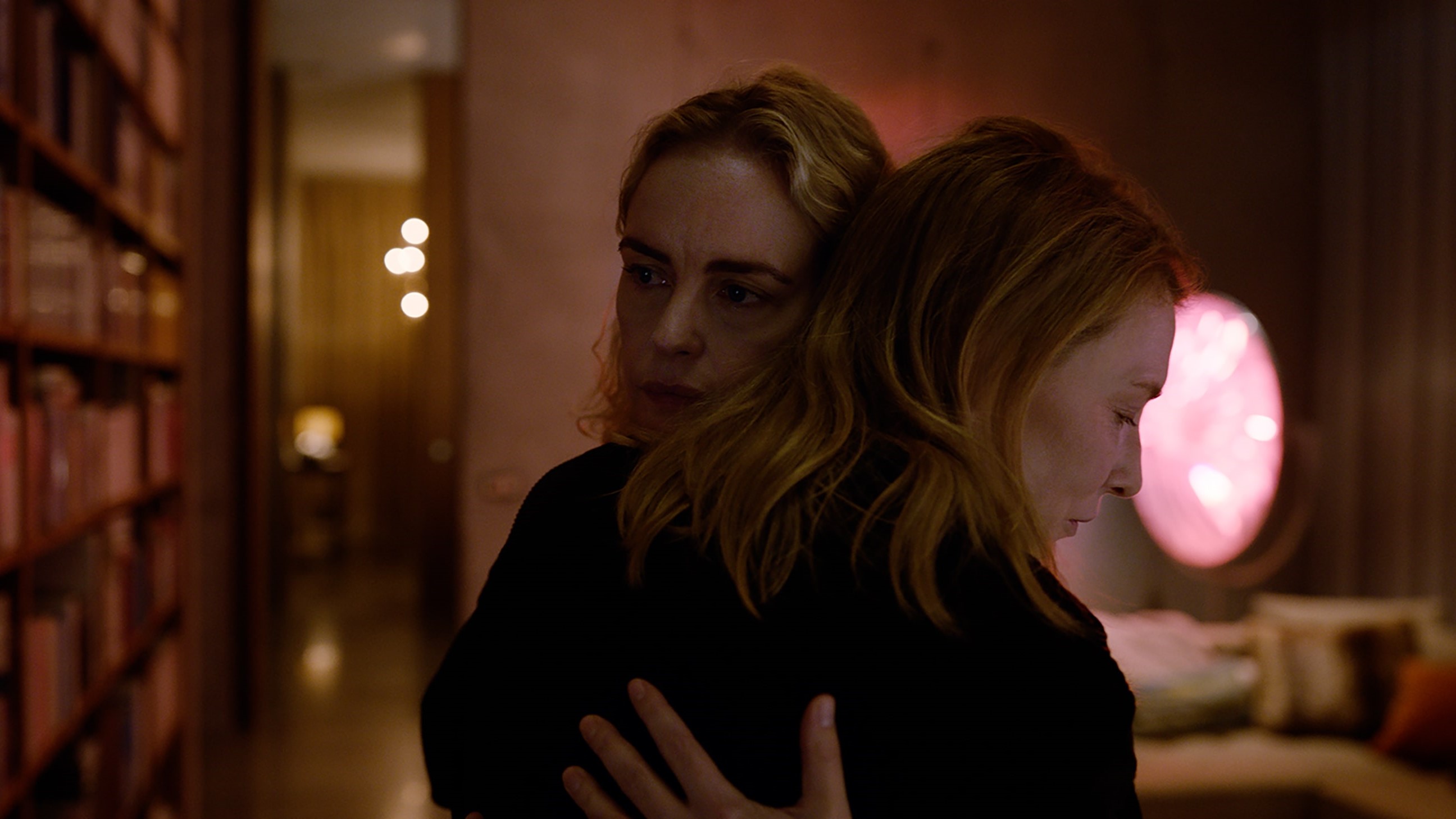One of the best films of 2022, Todd Field’s Tár ends on a cryptic note that will play as a litmus test for audiences. As the camera slowly creeps down the exit aisle of a Thai concert hall, panning past a packed house of concertgoers dressed in cosplay, one is left to confront their own judgments. Is this scene indicative of the decline of divine, harmonious, enlightened, classical art? Does it mock the dissonance of postmodern fantasy & cheap, bastardized creativity? Is Lydia, our fallen conductor, in a purgatory of sorts—so debased & desperate she’s stooped to conducting a live reenactment of the video game Monster Hunter’s score? Or has she persevered, like art itself, into a mutated, chintzier, yet creatively-resilient arena?
At the outset of Tár, Field seems to exhibit little sympathy for the artistic sensibilities of our current age. Like Lydia, the film itself operates within a snobbish, megalomaniacal, and bombastic space. It is both incredibly nuanced (on cancel culture) and extremely bloated (with garrulous pontifications on musicology and elitist tirades against the unreflective/unrefined artistic flotsam of our tech-centric society). Technology and its cultish, mass-mobilizing nature are at the forefront of the aesthetic battleground: emails, cellphone video camera recordings, social media edits, and virtue signaling are tantamount to Lydia’s downward spiral. Devices and gizmos are also front and center in the final Thai performance. We witness Lydia subjected to the humiliating indignity of conducting amongst a litany of tacky props—a background projector noisily descends, a dorky headset is placed on her head, cosplay accessories adorn the crowd, etc.
Compare these clumsy and indecorous gadgets to the immaculate grandeur that Lydia presided over in Germany. In stark contrast, the Berlin Philharmonic concert hall exemplified the purity and sanctity of highbrow artistry. Composed entirely of sleek, earthy, wooden décor and bereft of gratuitous plasticity or technology, Lydia’s immediate milieu as the chief conductor was marked by lavish, minimalist elegance. The simplicity of the design, like the rawness of Mahler, Bach, and Beethoven, showcased an elevated air of harmony, aesthetic integrity, and prestige.
This dichotomy is more than mere decoration and decorum—it’s a mentality that permeates Tár throughout. Thus, Lydia’s acerbic disparaging of a Juilliard student is par course for her exaltation of highbrow supremacy. After all, identity politics, whether morally correct or not, are anathema to the nuances of genius and musicology. As she derisively and superciliously points out to her petulant students, the crisis of contemporary art lies in our inability to look beyond superficial differences so as to unearth the primordial music lying dormant beneath.

What’s particularly intriguing about Lydia’s precipitous fall is that it leads her not only toward damnation and ruination but also toward salvation. In the arts, a force more perilous than technology is praise and adulation. As the celebrated chief conductor of the Berlin Philharmonic symphony, Lydia had clearly let the accolades and acclaim get to her head. Like the Gen-Z Juilliard students she haughtily ridiculed, she had become embroiled in the morass of political positioning, secondhand/ancillary discourse, and sycophantic gestures.
Lydia’s opening remarks while on stage with Adam Gopnik of the New Yorker reveal her intellectually savvy yet also distorted and highly gendered distinctions of classical music, in spades. We next accompany Lydia having lunch with Eliot Kaplan, head of a fellowship program for female conductors. Despite claiming ignorance of Women’s International Day and chastising identity-based discrimination (positively and negatively), her artistic persona and career trajectory are overtly riddled with references to feminism and identity-centered maneuverings.
Clearly, Lydia’s curation and artistic direction as the chief conductor had become immensely compromised. Coterminous to power is responsibility, and as a head “patriarchal” figure, Lydia found herself entangled in social relationships: Interpersonal conflicts (i.e., the interplay between power politics and genuine friendships) are omnipresent and define her every decision. From her snarky conversation with Eliot (where they discuss the hierarchical dynamics of transferring the assistant conductor Sebastian) to her subsequent inability to promote her personal assistant Francesca (in fear of Sebastian’s accusations of favoritism and in retaliation to Francesca’s failure to delete emails sent by a suicide victim whom Lydia had groomed and abandoned), Lydia is ensnared in a web of identity-centric politics.
Thus, when the allegations against her grooming surface, exposing her as guilty of the same abuses of power that have plagued countless artistic figures since time immemorial, it comes as no surprise. Lydia had become, like many power-hungry visionaries, intoxicated by her power. She’d become a toxic patriarch weaponizing social status and talent for selfish ends (sexually, professionally, artistically). It’s critical to point out that her snobbery and sense of invincibility remain ever-present throughout the film—whether engaging with publishers, students, her daughter’s bully, or her wife. There is, however, one recurrent place where Lydia’s vulnerability manifests—in the deafening quiet of solitude. Haunted by personal indiscretions, Lydia is increasingly haunted by night terrors, visual symbols, and sonic hallucinations (shrieks, metronome clicking, etc.). Whenever in isolation and seclusion, her guilty conscience repeatedly rears its head.

All this brings us back to the question of whether Lydia’s ultimate exile offered personal atonement or crucifixion or both. Before her arrival in Southeast Asia, Field shows two crucial scenes. The first occurs in her brother’s basement. Here, Lydia watches an old, dusty VHS tape of her former mentor, Leonard Bernstein, preaching on the edifying merits of conducting a symphony. The moment is not enigmatic in the least—Lydia is reminiscing upon her moral, spiritual, and artistic origins at a time of reckoning. She’s reconnecting with the pure-hearted spirit that had been led astray.
A second critical scene in Tár involves a paroxysm of startling violence—with Lydia storming onstage to sucker punching Eliot Kaplan as he leads the Berlin orchestra through Mahler’s 5th Symphony. As a gay, Jewish, ultra wealthy figure who Lydia called out in the initial luncheon for trying to network/schmooze his way into a conductor position he doesn’t deserve, Eliot represents the supremacy of nepotism. Thus, while the attack is at base level a maniacal outburst of outrage, it also represents a cathartic desecration of inorganic power politics within the arts.
It’s striking that Field immediately transitions from this rousing, climactic sucker punch to the film’s coda—immediately showing Lydia’s undignified yet irrepressible arrival in Thailand. Everything about Southeast Asia is antipodal to America. Field accentuates the contrast largely through the sound design. Within the raucous and exotic environment of Bangkok, noise becomes atmospheric, immersive, and engulfing. Lydia is shown constantly in transit during this epilogue—riding tuk-tuks, canal taxis, and riverboats amid a frenzy of foreign sounds and ambient textures. Long gone are the isolated sonic distillations of western austerity. She’s now subsumed in a cacophonous landscape that mocks her preference for control, authority, and precise calibration.

These scenes in Tár also harken back to Lydia’s terse exchange with her brother in the latter’s New Jersey home, wherein he chastised her for being an aimless and lost soul: “You don’t know where the hell you came from or where you’re going.” These words have been echoed repeatedly by philistine, proletarian siblings for generations. They exhibit both a humbler perspective and doltish understanding of identity as inherited and confined/defined by geographical, familial, and genetic parameters. Lydia’s return to her brother’s home humanizes her. We see the unglamorous, lower-middle-class drudgery she was hellbent on escaping. We see her nuclear family’s obliviousness to her stalwart ambition and identity—her calling and conviction as a devoted artist.
Sure, Lydia is hiding away in Thailand, having fallen from grace and disgraced by the tabloids, but she’s also rediscovering herself. Field doesn’t show Lydia tearing up while watching the analog tape of Leonard Bernstein for naught. Her authentic, artistic passion runs deep in her marrow. It’s therefore apropos that Lydia never buckles or caves. Instead, she winds up alienated across the world. Some may see her resolve and exile as an example of headstrong stubbornness. Others may see it as deserved comeuppance. These are not wrong impressions. Lydia does not experience a clean break or grab slate. She is mocked, haunted, and tortured by her past, as witnessed in her visit to an inhumane massage parlor, wherein one of the enslaved masseuses suddenly transforms into Olga, Lydia’s last protégée she’d failed to groom. But she also undergoes radical transformation —detuned and retuned into a new composition.
Lydia’s relocation to Thailand offers her an opportunity for redemptive reincarnation. She personifies the essential loneliness of the true artist. Sure, she may have been ethically transgressive and politically dubious during her reigning tenure at the Berlin Philharmonic. Yet, she’s also a relic of the modern world—insofar as she’s willing to pursue her artistic passion despite the loss of fame and fortune. The shot of Lydia behind a noisy, dissonant waterfall perfectly captures her indomitable spirit. She’s now separated from her surroundings—looking through a cascade of water as if in an aquarium. As Tár concludes, she’s now detached from her former reality—removed from the mellifluous harmonics of that insular, ultra-pampered world. In one sense, she’s as unmoored, adrift, and undefined as ever. In another, she is ardently undeterred from being who she essentially is: an artist.


